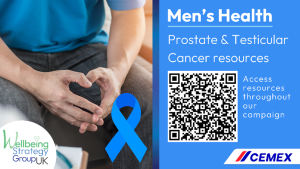Our Men’s Health campaign aims to bring awareness to health issues that affect men disproportionately and focuses on encouraging men to become aware of problems they may have or could develop and gain the courage to do something about it.
This week’s focus is on Prostate and Testicular Cancer.
While some people do confuse them, prostate and testicular cancer are separate conditions that have different risk factors, symptoms, and outcomes.
Prostate Cancer is much more common than testicular cancer and is the most common cancer in men.
Some FACTS:
- Most men with early prostate cancer don’t have symptoms because of the way the cancer grows.
- Prostate cancer is not always life-threatening, but when it is, the earlier you catch it the more likely it is to be cured.
- The chances of developing prostate cancer increase as you get older, most cases develop in men aged 50 or older.
- Prostate cancer is more common in black men and less common in Asian men.
- Obesity increases the risk of prostate cancer.
The Prostate Cancer UK charity has a tool, to check your risk in 30 seconds – why not give it a try! Click here to check your risk.
You can find out all about symptoms, diagnosis, testing and treatment on the following websites:
- https://www.nhs.uk/conditions/prostate-cancer/
- https://prostatecanceruk.org/prostate-information-and-support
We have also shared some resources about Prostate Cancer in our Men’s Health – UK News download page HERE.
Testicular Cancer is cancer that’s found in the testicles. It is most common in men aged 15 to 49. How serious testicular cancer is depends on the type of testicular cancer, how big it is and if it has spread.
Main symptoms of testicular cancer:
- a lump or swelling in your testicle
- your testicle getting bigger
- an ache or pain in your testicle or scrotum (the skin that covers the testicles)
- your scrotum feeling heavy, firm or hard
Other symptoms include:
- an ache or pain in your back or lower tummy
- losing weight without trying
- a cough
- difficulty breathing or swallowing
- a sore or swollen chest
These symptoms are very common and can be caused by many different conditions. Having them does not definitely mean you have testicular cancer but it’s important to get them checked by a GP. This is because if they’re caused by cancer, finding it early may mean it’s easier to treat – it is therefore important to check your testicles regularly. Click HERE to find out how to do this.
You can find more information, including symptoms, causes and tests Testicular Cancer here:
